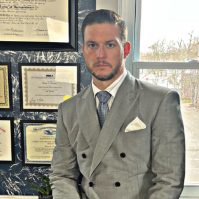 Concord White Collar Crime Lawyers, Michigan
Concord White Collar Crime Lawyers, Michigan
Sponsored Law Firm
-
 x
x

Click For More Info:
-
Marrs & Terry, PLLC
6553 Jackson Road Ann Arbor, MI 48103» view mapBankruptcy & Debt, Criminal Defense, Estate Personalized, Efficient Counsel
Marrs & Terry, PLLC have been helping individuals face a variety of legal challenges, including bankruptcy, estate planning and administration, and family law.
800-862-7221
Not enough matches for Concord White Collar Crime lawyer.
Below are all Concord Criminal lawyers.
Sponsored Lawyers
1-10 of 12 matches
Criminal, Constitutional Law, State Trial Practice, Civil Rights
As a Hillsdale County native, Daren Wiseley is thrilled with the opportunity to serve his home community. He focuses his practice on criminal defense and constitutional/ civil rights litigation, where he is committed to defending individual rights, in a time when they are under assault more than ever. Mr. Wiseley is known for his passion and work ethic and brings a hard-hitting style to the courtroom. Mr. Wiseley takes prides in going the extra mile for clients and aggressively defending them. He is known for his skillful courtroom strategy and creative motion practice. Additionally, Mr. Wiseley brings knowledge and expertise of the media to the table to better serve his clients. Few lawyers understand the importance of media relations and its inner workings.Mr. Wiseley loves being a warrior for the underdog. He thrives in high-stakes cases and refuses to budge under pressure. A recent example of this occurred in a case regarding a rarely used felony eavesdropping statute that had no case precedent. Even though the media, and even most lawyers counted him out, he used his tireless work effort and thoughtful creativity to win the case after oral argument on his motion to dismiss. Mr. Wiseley has significant experience defending Constitutionally protected rights, and understands the role of protecting citizens against government overreach. One notable example occurring when a client was charged with a felony for a harmless Facebook post - Mr. Wiseley was able to get this charge dismissed as well. Both cases also provided examples of Mr. Wiseley's ability to influence the court of public opinion, to protect his clients' from reputational harm in the community.Mr. Wiseley is highly sought after throughout Michigan, practicing in counties throughout the state and both federal districts. When he is not in the office defending liberty, Mr. Wiseley loves golfing with his grandfather, reading, working out, and playing with his cat, Ovi.
(more)




 Tricia Terry Ann Arbor, MI
Tricia Terry Ann Arbor, MI AboutExperienced Michigan Lawyer
AboutExperienced Michigan Lawyer Articles
Articles

